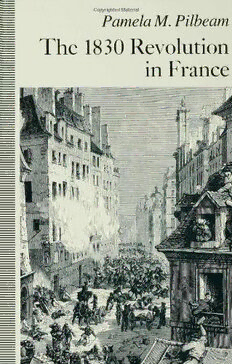
The French Revolution of 1830 PDF
Preview The French Revolution of 1830
THE 1830 REVOLUTION IN FRANCE Also by Pamela M. Pilbeam and published by Macmillan THE MIDDLE CLASSES IN EUROPE, 1789-1914: France, Germany, Italy and Russia The 1830 Revolution in France Pamela M. Pilbeam Reader in Modern European History Royal Holloway University of London M MACMILLAN © Pamela M. Pilbeam 1991 All rights reserved. No reproduction, copy or transmission of this publication may be made without written permission. No paragraph of this publication may be reproduced, copied or transmitted save with written permission or in accordance with the provisions of the Copyright, Designs and Patents Act 1988, or under the terms of any licence permitting limited copying issued by the Copyright Licensing Agency, 90 Tottenham Court Road, London W1P 9HE. Any person who does any unauthorised act in relation to this publication may be liable to criminal prosecution and civil claims for damages. First edition 1991 Reprinted (with minor alterations) 1994 Published by THE MACMILLAN PRESS LTD Houndmills, Basingstoke, Hampshire RG21 2XS and London Companies and representatives throughout the world ISBN 0-333-52701-1 hardcover ISBN 0-333-61998-6 paperback A catalogue record for this book is available from the British Library. Printed in Great Britain by Antony Rowe Ltd Chippenham, Wiltshire To Stephen, Ashka, Rhys and Llewellyn Contents Preface ix 1 Historians and the Revolution 1 2 The Political Crises of the Bourbon Restoration 13 3 The Economic Crisis and the Revolution 37 4 The 'Three Glorious Days' 60 5 The Liberalism of the Orleanist Settlement 80 6 Religion and Revolutionary Politics 99 7 The Bourgeois Revolution 121 8 Une Revolution Escamotee 150 9 Conclusion 187 Notes 195 Bibliography 216 Index 234 vii Preface The 1830 revolution is depicted here as more than the Parisian bourgeois victory of the 'Three Glorious Days'. The chronological span of this investigation stretches from the early 1820s to 1835; the geographical span to as extensive a range of departmental archives as purse, family loyalty and professional demands would permit. The approach is thematic, asking how far the revolution can be seen as bourgeois, liberal, artisan or anti-clerical. The exploration of these issues is frequently traced over a broad canvas, relating the situation of the early nineteenth century to that of the 1790s. It is a history of revolution and popular unrest in and around 1830, but it also investigates the significance of revolution in general. I owe a great debt of gratitude to Professor Alfred Cobban who guided me in my initial PhD foray into 1830 and to all the members of his research seminar at the Institute of Historical Research, London who listened patiently to early drafts of these chapters, posed searching questions and offered wise counsel. On the sage advice of one contemporary, I shall name no names, leaving them the option of receiving the final result with favour. Earlier versions of several chapters have appeared as articles in learned journals. I am delighted to have the opportunity to record my thanks to many patient and helpful archivists: in the Archives Rationales, the Archives de la Guerre and in departmental and municipal archives too numerous to mention, although I must single out Mile Odile Colin, formerly archiviste-en-chef at Chaumont, Haute-Marne. I am also grateful to librarians, both in the Bibliotheque Rationale and many municipal libraries. A very special thank you is due to my undergraduate students, particularly the members of special and optional courses on French history, and also to all those extramural students who enthusiastically shared my preoccupation with early nineteenth-century France. I must thank the University of London, especially the Central Research Fund and the Institute of Historical Research, and the French government, who provided grants and scholarships to support lengthy research in French archives. Above all, it is a privilege to be able to record my heartfelt thanks to my husband, Stephen and our children, Ashka, Rhys and Llewellyn, who have unstintingly and with good humour and love shared their lives with this project. They must expect the regime of odd socks, dusty shelves and a busy word-processor to continue! Pamela Pilbeam IX
